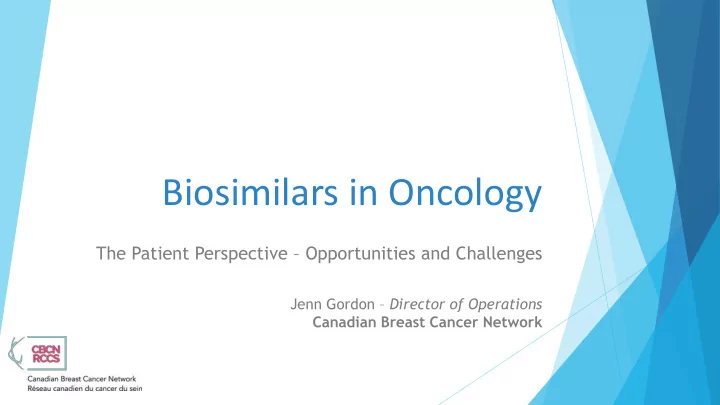

Biosimilars in Oncology The Patient Perspective – Opportunities and Challenges Jenn Gordon – Director of Operations Canadian Breast Cancer Network
Disclosure: CBCN receives educational grants and funding from the following industry members: Amgen, AstraZeneca, Eli Lilly, Janssen, Novartis, Pfizer, Roche, Teva
Biosimilars & Breast Cancer Whitepaper CBCN conducted two national virtual roundtables in the fall of 2018. One with 7 breast cancer patients. One with 6 Canadian medical oncologists. The observations, key takeaways and recommendations that resulted from these roundtables are shared through this whitepaper
The Patient Perspective (I) Lack of confidence / trust in biosimilars: Need for reassurance and clear communication from clinicians that a biosimilar would offer the same outcomes as the reference biologic. Treatment efficacy and side effects: Concern that the minimal clinical studies conducted with biosimilars may not provide enough data to clearly understand the side effect profile and offer the same assurances around efficacy. Similarly there were concerns around the extrapolation of data from one indication to the next.
The Patient Perspective (II) Communication with Patients: Patients should be informed and resources that explain biosimilars should be made available. Patients ultimately trusted that their oncologist would make the right treatment decision for them, but expressed concern over being switched from one drug to another. Need for guiding principals for the use of biosimilars in oncology treatment: Patients wanted to see clear guidance in terms of the use of biosimilars for oncology. Application of cost-savings: Patients saw and understood the cost-savings potential, and would like to see reinvestment into new therapies.
The Physician Perspective (I) Experience and comfort in use: varied broadly among physicians, especially in terms of extrapolation of data from one setting to another. Implementation: Not all physicians are comfortable with required switching for patients on an existing reference biologic. Stage of tumour should be taken into consideration when considering interchangeability. There needs to be strict adherence to post-market surveillance. Assurances for drug supply management from biosimilar manufacturers is essential. Patient support programs offered by the innovator manufacturer are important supports and should be offered by biosimilar manufacturers.
The Physician Perspective (II) Communication with patients: the term “biosimilar” is confusing and clear communication and assurances from physicians is important. Cost implications: are important but should not be the determinant of which treatment to select for a patient.
What Success Looks Like Comprehensive Education for Health Care Professionals: HCPs in the oncology space need to be supported with comprehensive information and educational opportunities to increase confidence in prescribing biosimilars. This directly impacts the patients’ level of confidence and trust in the medication they’re receiving. Improved Information and Education for Patients: Resources and educational materials need to be developed for patients that help them understand the use of biosimilars in oncology without elevating their anxiety. Robust Post-Market Surveillance: Needs to be supported and conducted to enable increased confidence in biosimilar products. Address Concerns about Switching and Interchangeability: Switching and interchangeability cause increased anxiety for patients when this is being considered as an option. Allowing patients to stay on the original therapy they started, whether it’s the reference biologic or a biosimilar, is important for minimizing patients’ anxiety. Leverage Cost Savings for Improved Access: Provide an important opportunity to manage financial challenges within the drug budget, and those savings provide an opportunity to invest in new innovative therapies for patients.
Recommend
More recommend